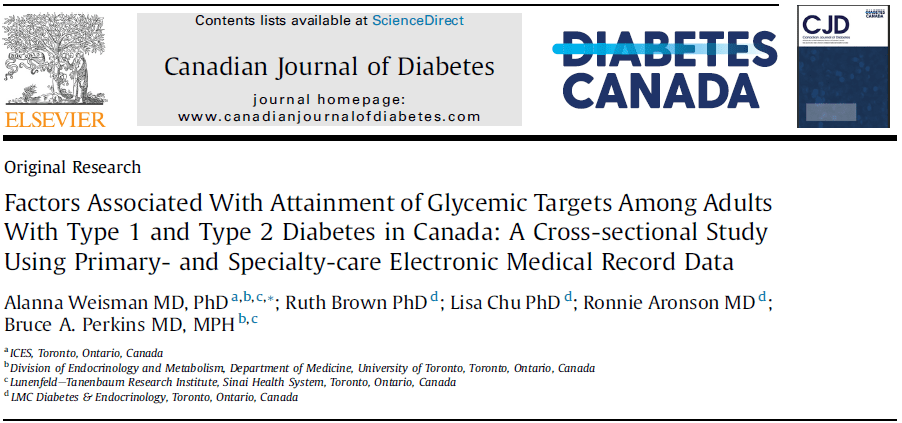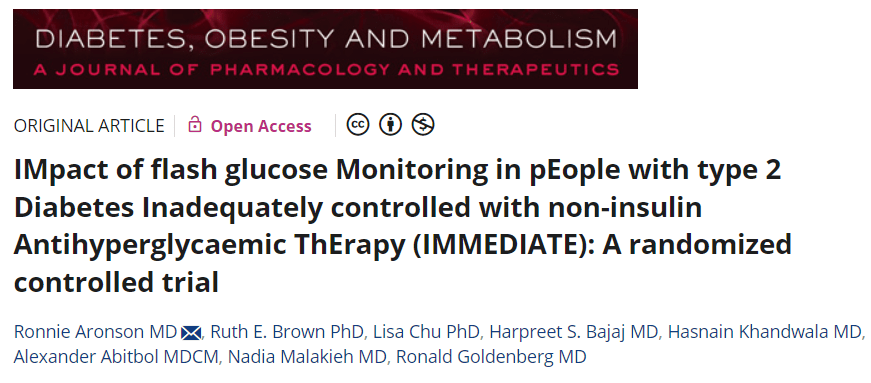Factors Associated With Attainment of Glycemic Targets Among Adults With Type 1 and Type 2 Diabetes in Canada: A Cross-sectional Study Using Primary- and Specialty-care Electronic Medical Record Data
As the burden of diabetes rises globally, countries are increasingly focused on national strategies for diabetes outcome evaluation and healthcare delivery. Clinical practice guidelines recommend a target glycated hemoglobin (HbA1c) of ≤7.0% for the majority of adults with diabetes. This cross-sectional observational study used a new database combining primary- and specialty care electronic medical records (EMR) to determine attainment of glycemic targets and associated predictors among adults with diabetes in Canada. The two data sources included: 1) Diabetes Action Canada’s National Diabetes Repository, containing deidentified EMR data from participating primary care providers in Ontario, Alberta, Manitoba, Québec, and Newfoundland, and 2) the LMC Diabetes Registry, containing deidentified EMR data from 13 diabetes specialty clinics in Ontario, Québec and Alberta. Among 122,106 adults with diabetes, target HbA1c of ≤7.0% was attained by 60% of adults with type 2 diabetes not prescribed insulin, 25% of adults with type 2 diabetes prescribed insulin, and 23% of adults with type 1 diabetes, demonstrating low attainment of glycemic targets. Potential contributors to suboptimal glycemic outcomes were sex, income, geographic location, and therapeutic inertia. Further work is required to understand and optimize outcomes with adults with diabetes, and to address factors contributing to glycemic outcome disparities.

Specialist-led diabetes registries and predictors of poor glycemic control in type 2 diabetes: Insights into the functionally refractory patient from the LMC Diabetes Registry database
IMpact of flash glucose Monitoring in pEople with type 2 Diabetes Inadequately controlled with non-insulin Antihyperglycaemic ThErapy (IMMEDIATE): A randomized controlled trial

Continuous glucose monitoring (CGM) has been shown to improve glycemic outcomes in individuals with diabetes using insulin therapies. The objective of this multi-site, open label, randomized controlled trial was to examine the glycemic efficacy and patient satisfaction of intermittently scanned glucose monitoring (isCGM) in adults with type 2 diabetes using non-insulin therapies for diabetes management. Adults with type 2 diabetes were randomized to either receive an isCGM and diabetes self-management education (DSME) or DSME alone for 16 weeks. The participants who received an isCGM device and DSME had greater time in mean target glucose range by 9.9% and reduced mean HbA1c by 0.3% compared to participants who received DSME alone at 16 weeks of follow-up. Glucose monitoring satisfaction also improved in the isCGM and DSME arm compared to the DSME arm. The IMMEDIATE randomized controlled trial demonstrated that among non-insulin treated adults with type 2 diabetes, use of isCGM improved glycemic outcomes.
Specialist-led diabetes registries and predictors of poor glycemic control in type 2 diabetes: Insights into the functionally refractory patient from the LMC Diabetes Registry database
